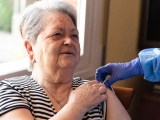Oct 17, 2008 (CIDRAP News) – A recent Associated Press (AP) report revealed that, in the name of preventing biological attacks, the United States has rules barring the exportation of vaccines for avian influenza, smallpox, yellow fever, and many other pathogens to five countries classified as sponsors of terrorism.
Under Department of Commerce rules, vaccines for a long list of viruses, bacteria, and biological toxins cannot be exported to Cuba, Iran, North Korea, Sudan, and Syria unless they obtain a special export license, which can take weeks.
Pandemic flu vaccines are not restricted under the rules. But the Department of Commerce confirmed that—as reported by the AP—Cuba, Iran, and Sudan are subject to a ban on pandemic flu vaccines as part of general US trade embargoes covering nearly all products. Those embargoes are based on "broader foreign policy reasons," said Kevin Kurland, a spokesman for the department's Bureau of Industry and Security.
The list of pathogens subject to the rules includes many viruses, some of which are little known and some of which there is no vaccine for. Examples, besides those mentioned, are the viruses that cause dengue fever, Ebola fever, Marburg fever, Rift Valley fever, and monkeypox. A list of animal pathogens covered by the restrictions includes highly pathogenic avian flu viruses.
Bacterial pathogens on the restricted list include anthrax and the microbes that cause tularemia and plague. Not on the list are the causes of common vaccine-preventable diseases, such as measles, mumps, rubella, chickenpox, and seasonal influenza.
It can take up to 40 days for a country to obtain an export license for a restricted product, Kurland told CIDRAP News. But he said humanitarian needs are considered, and licenses can be granted much faster in emergencies.
Rules go back to 1990s
The AP report said the restrictions were quietly established in the mid 1990s and were strengthened after the Sep 11, 2001, attacks and subsequent anthrax mailings. Officials from the Department of Health and Human Services (HHS) and the Centers for Disease Control and Prevention were not even aware of the regulations until the AP asked about them, the story said.
Disease and bioterrorism experts say there is little reason to think that exporting the vaccines would increase the risk of biological attacks, but a Commerce Department official quoted in the AP story defended them.
"Legitimate public health and scientific research is not adversely affected by these controls," Assistant Commerce Secretary Christopher Wall told the AP.
Concerning avian flu vaccines for poultry in particular, Wall declined to explain what kind of threat they pose, but said there are valid reasons for taking steps to ensure they "do not fall into the wrong hands," according to the story.
In response to questions from CIDRAP News, Bill Hall, an HHS spokesman in Washington, DC, said HHS is not usually consulted about trade sanctions, even when they involve medical products. "The United States government currently requires a license for the export from the US of a wide range of goods, products, and services to Cuba, Iran, and Sudan as part of its overall foreign policy," Hall commented by e-mail.
"Although these licensing requirements cover exports of medical products such as human influenza vaccine, HHS is not routinely consulted on the foreign policy decisions to impose sanctions on exports of U.S. goods to state sponsors of terrorism, even including medical products such as vaccines.
"In the meantime, HHS is working closely with the Department of Commerce and other government agencies to determine the most effective and humane actions the US government could take to help protect global public health, regardless of the nation or nations involved."
Vaccines into weapons?
Scientists quoted in the AP report said the idea that vaccines could be used to make biological weapons makes little sense. Vaccines typically contain inactivated viruses or bacteria or pieces of a virus or bacterium, though some vaccines use live but weakened microbes. Smallpox vaccine contains live vaccinia virus, a less dangerous relative of the smallpox virus.
Referring to avian flu vaccines, Ian Ramshaw, an immunology and biosecurity expert at Australian National University in Canberra, told the AP, "I can think of no scientific reason how a terrorist organization could use such a vaccine for malicious intent. I personally think it's a rather silly attitude and the U.S. is probably going overboard as it has in the past with many of its bioterrorism initiatives."
Infectious disease expert Michael T. Osterholm, PhD, MPH, said he doesn't see the logic behind the restrictions either. He is director of the University of Minnesota Center for Infectious Disease Research and Policy, which publishes CIDRAP News.
"There really isn't any reason that using the vaccine to create the agent would be a concern," he said. "The only potential implication is if you had individuals working on [weaponizing] the agent, by vaccinating them you could protect them so they could work on it."
He observed that the idea of weaponizing the H5N1 avian flu virus, for example, is not a concern, since the virus does not easily infect humans or spread easily from person to person. The virus could be used as a weapon against poultry, "but that's not about the vaccine," he said. "So I don't understand the logic about this at all."
"Anywhere in the world you can reduce the potential for these diseases, we should do that," Osterholm said.
Kurland said countries subject to the restrictions can get export licenses fairly quickly in emergencies.
"By executive order, the process for reviewing licenses can take up to 40 days, although this can be expedited in emergency situations," he said via e-mail. "Humanitarian issues are considered in license applications. During recent hurricane relief efforts in Cuba, for example, license applications for such humanitarian efforts were processed in 4 days or less."
See also:
Commerce Department regulations supplement listing pathogens whose vaccines are subject to export restrictions for countries classified as sponsors of terrorism (see pages 57-60, 70)
http://www.access.gpo.gov/bis/ear/pdf/ccl1.pdf





















